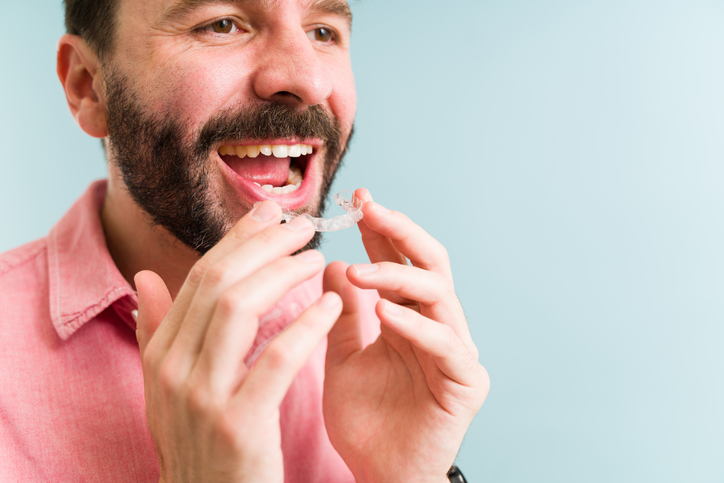
Invisalign has successfully corrected overbites for millions of people. It can help fix your dental issues as well!
Invisalign corrects many orthodontic issues, from crooked alignment to wide gaps between teeth. But can these clear plastic devices also treat your overbite? Yes! Invisalign aligners have successfully corrected mild to moderate overbites for decades.
An overbite is a malocclusion where the upper teeth extend over the lower teeth. The severity of the overbite is measured by the gap between the upper and lower teeth. One study estimated 8 percent of a sample size of 7,000 people between the ages of 8 to 50 showed a severe overbite of 6 millimeters or more, with the average overbite at 2.9 millimeters. Another study estimates two-thirds of U.S. adults have an untreated overbite. The good news is that most overbites will benefit from Invisalign.
How can Invisalign fix an overbite?
Your dentist will first take a 3D image of your mouth before developing a treatment plan based on the image. New custom aligners will be sent to you every week or two weeks. These aligners (or trays) apply gentle pressure on the teeth to gradually move them into place.
The length of the treatment time depends on the severity of the orthodontic issue being corrected, but it typically ranges from six months to two years. The aligners must be worn 20 to 22 hours each day for the treatment to be successful. Once the treatment ends, you’ll wear a retainer to maintain the teeth in their proper alignment.
In some cases, Invisalign works with elastic bands to create more pressure and speed up the treatment time. The elastic bands are attached to tooth-colored buttons on a top tooth and a bottom tooth, usually an upper canine or lower molar.
Invisalign works especially well with younger people because their jawbones haven’t fully formed. Because the jawbone is still growing, it can be more easily realigned. Older adults can still benefit from Invisalign, but the treatment may take a bit longer.
Why fixing an overbite is important
Correcting an overbite is more than a cosmetic procedure. An overbite can cause jaw pain and make chewing and speaking difficult. Misaligned teeth are also more vulnerable to decay and damage.
With straighter teeth, you can clean between teeth easier, thereby lessening the chance of tooth decay and gum disease. You’ll have less pain, will speak clearer, and feel more confident.
Caring for Invisalign
Now that you have Invisalign, how do you take care of the trays? Although each Invisalign tray is temporary, you still must care for the device to ensure its effectiveness and transparent color. A clean, well-maintained aligner also prevents bacteria from attaching to your teeth. Maintaining Invisalign is easy with some simple tips:
Clean each night. Simply rinsing the aligner with water isn’t enough. Each night, soak the aligner in a solution specially made for Invisalign. Do not use denture cleansers as those agents are too harsh for Invisalign.
Use a soft-bristled brush. A soft-bristled brush gently cleans the aligner without abrasions. Don’t use toothpaste as the product may damage the trays. Mouthwash containing alcohol is also not recommended for Invisalign.
Don’t rinse with hot water. Hot water can bend the tray out of shape. When cleaning and rinsing, use warm or lukewarm water.
Take out the aligner when during mealtimes. To maintain the clarity of the aligner, you can take the aligners out when eating or drinking. Just be sure to brush your teeth before you put the aligners back in so bacteria isn’t trapped between your teeth and the tray. Before you re-insert the aligner, you can rinse it, but remember to clean thoroughly at night.
Time for Invisalign?
Schedule an appointment at Espire’s Colorado Springs location today! Our highly trained dentists can discuss whether Invisalign is the right solution for you. Don’t live near our Colorado Springs office? Find one of our other locations near you.
Colorado Springs
8610 Explorer Drive #315
Colorado Springs, CO 80920


